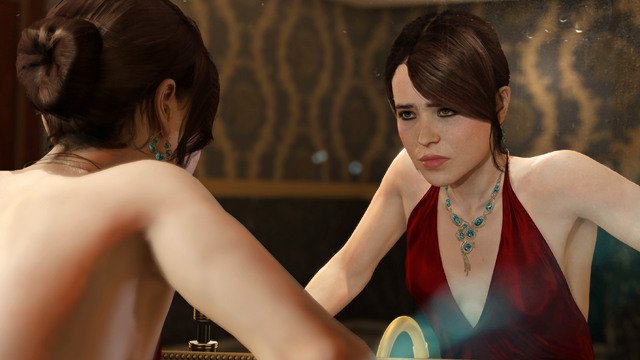Note: These are my personal views. GameRevolution’s Nick Tan reviewed Beyond: Two Souls and actually liked it, so maybe I’m just crazy.
I have controlled my video games in many different ways over the years. I have tilted my PlayStation 3 controller to guide the trajectory of a petal in flower; I have swung my WiiMote to simulate hitting a tennis ball in Wii Sports; I have even lethargically gyrated my hips in order to mimic a thoroughly degraded dancing Han Solo in Kinect Star Wars. More so than any other entertainment medium, video games offer a myriad of ways in which you can experience them. The recently released Beyond: Two Souls, though, continues developer Quantic Dream’s trend of taking control away from the player, instead choosing to guide you carefully through its story rather than having you explore it. The question being asked of it by its detractors, though, is why?
Literature, cinema and video games each offer something unique to the reader, viewer, and player. A book will work in tandem with the reader’s imagination to create a world and its inhabitants, whereas a film will put that world up on screen for the viewer to see. However, a video game allows the player to reside within the world and to have a physical, personal impact upon its surroundings. But if a game lessens that impact, diminishing it to the point where the player is more of a bystander to the events that unfold rather than an active participant, does that make it more of an “interactive movie” than a video game? Beyond: Two Souls creator David Cage doesn’t think so:
A video game can be so many different things. Angry Birds is a game; Call of Duty is a game; World of Warcraft is a game; Gone Home is a game. Who can decide 'you are a video game', 'you are not a video game', 'you are not a part of this family?' No. Let's open this medium to whoever has different ideas and it's great to see people trying to do games where shooting is not the main thing.
Cage is right in saying that no one should judge a game for deviating from the recognised traits of the medium, and Cage and Quantic Dream shouldn’t be chastised for their cinematic influences, but it seems that Beyond isn’t inspired by the movies so much as it desperately wants to be one.
Hearing detractors of Heavy Rain label it as little more than an interactive movie annoyed me. Heavy Rain was one of my favourite games from the PS3’s healthy library, because while it was undoubtedly flawed, navigating my way through its stories’ multiple choices was one of the most engrossing experiences I’ve had with a video game. But whereas I felt that Heavy Rain had limiting gameplay that was wonderfully contrasted by the huge amount of input I was given into its world, I felt almost completely useless in Beyond.

Quantic Dream has recognised that offering multiple choices to players in Heavy Rain was that game’s big selling point, so they give you similar options in Beyond. However, in Beyond these choices stand to give you the illusion of freedom, rather than actual freedom. I actually put my controller down during a handful of the many quick-time event segments, and the conclusion of each scene played out the same as it would have done had I participated, albeit with protagonist Jodie (Ellen Page) getting her arse kicked a little more along the way.
Even the scenes in which you control Aiden, the mysterious ghostly presence who accompanies Jodie throughout her journey, ultimately boil down to you being given the choice of knocking over a few chairs or strangling people half to death. The flow of the narrative doesn’t change in accordance with your decision, though, with this also being echoed in the scenes in which you’re asked to either refuse or accept the requests of the supporting characters, with Jodie always ignoring your decision if it contradicts the direction the story is headed in. So while I agree with Cage’s belief that no one should be allowed to define what a game is, with Beyond it doesn’t feel like he set out to make a game at all. Detractors of Cage’s work have said that he is an aspiring film director trapped inside the body of a video game developer, and Beyond stands to prove them right.
Heavy Rain was criticised for aping cinema, but it presented an experience that was uniquely game-y. Likewise, games such as the aforementioned Gone Home and The Chinese Room’s Dear Esther which, like Beyond, also limit the player’s influence on their worlds, both offered something that couldn’t have been achieved in any other medium. On the other hand, I feel that Beyond: Two Souls occupies an awkward middle ground between both film and video game, with it featuring too little gameplay to be considered a “cinematic experience” in the vein of The Last of Us or BioShock Infinite, yet being bogged down by the kind of lengthy runtime expected of a triple-A release. I found it unenjoyable on both fronts, but more than that, I found it to be depressingly emblematic of the direction big-budget games are steadfastly headed in.

For a while now we have allowed top titles to choose to hold our hand through carefully orchestrated sequences rather than allowing us to experience them freely. As more and more emphasis is put upon the narrative of a game rather than its gameplay, I feel like Beyond is an example of what happens when the pendulum swings too far in that direction. Since Indigo Prophecy I have defended David Cage and his team’s creative vision, but now I’m starting to wonder whether that vision has always been to create a movie, and if Quantic Dream’s previous output was just testing the water to see how much we cared about the game beneath the well-rendered facial animations.
The story Beyond: Two Souls has to tell isn’t a particularly bad one, but it’s one that could’ve been told much more proficiently in 130 minutes rather than 8 hours, and on a cinema screen where you wouldn’t be forced to press R2 to have Ellen Page climb up a ladder. Its appearance on the PlayStation 3 isn’t due to Quantic Dream having a great story to tell that could’ve only been told in the form of a video game, but rather that Quantic Dream is a video game developer and that’s the medium that they are therefore forced to express themselves in.
[Editor's Note: Beyond: Two Souls has received a starkly wide range of critical scores from a pitiful 25 to the absolute 100, so I understand the criticisms lodged at the game's lack of agency and lack of impact when it comes to the choices it presents. I agree that Heavy Rain was for more experimental, daring, and intricate than the more restrictively linear, "going through the motions" Beyond: Two Souls.
But I think it's easy as critics and longtime gamers to be bound to the idea that video games need to be games as we've viewed them, and even then, it's not like video games haven't had linear narratives before. And Beyond: Two Souls' is better than the vast majority of them. I actually enjoyed its linear storyline for focusing on the life of a single character, Ellen's and Willem's performances, and the supernatural construct of Aiden. So despite my misgivings about its complexity, I genuinely liked it. ~Ed. Nick]










